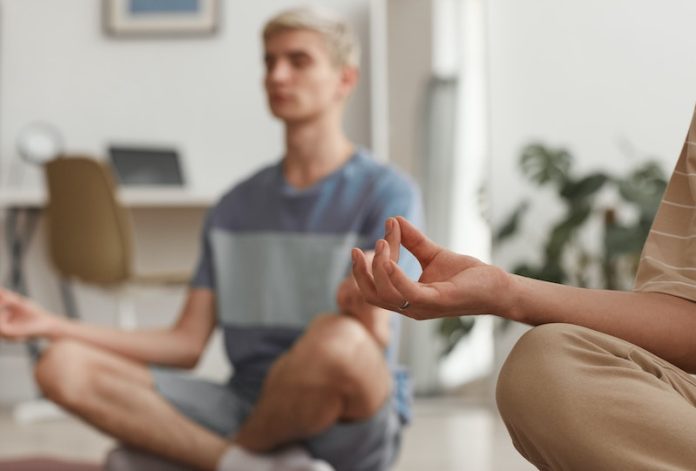
Are you worried about maintaining your New Year’s resolutions, or otherwise just stressed out about the latest COVID-19 surge as the pandemic drags into another year?
Two Rutgers School of Nursing–Camden professors who recently published a study on the effects of mindfulness practices say mindfulness can help you deal with stress and stay on track with New Year’s resolutions.
Sheila Linz, an assistant professor and psychiatric nurse practitioner, and Kathy Jackson, a family nurse practitioner and clinical assistant professor, recently published research in the Journal of Psychosocial Nursing and Mental Health Services that showed how mindfulness can support coping for women facing stress.
Linz and Jackson, who based their article on research of mindfulness sessions they led for residents living in Housing Authority of the City of Camden communities, explain how mindfulness can benefit anyone with an interest to try it.
What is mindfulness?
Linz/Jackson: Mindfulness is about being fully present and paying full attention to thoughts, emotions and bodily sensations as they occur in the present moment.
It is about being open to and focused on the present moment, being aware of where we are and what we’re doing and taking the time to act, and not to just react, to life situations.
“Mindfulness” was defined by Jon Kabat-Zinn (the original developer of a mindfulness stress reduction program) as “paying attention in a particular way, on purpose, in the present moment and nonjudgmentally.”
Who does mindfulness and meditation help the most?
Linz/Jackson: Mindfulness meditation helps people with anxiety, stressful life events, unregulated emotional states and pain to become more in tune with their mind and body.
Most people can benefit from the practice. It is for anyone who has the desire to work on themselves in this way.
What are the benefits of mindfulness practices?
Linz/Jackson: Mindfulness meditation can improve the way we deal with stress by offering an easily accessible method to calm ourselves.
Through research, it has been shown to improve coping, lower cortisol levels, lower depression, regulate emotions and improve social relationships.
One can develop their mindfulness meditation abilities over time just by practice.
It can help people to live more intentionally, increase attention in the present moment and promote an attitude that is more nonjudgmental, curious and kind (what the world needs now).
Do you think doing mindfulness meditation regularly makes for a good New Year’s resolution?
Linz/Jackson: Yes, as it promotes calm and wellness, improving our mental outlook, and can increase enjoyment of our world.
It changes your frame of mind and opens up possibilities. Doing mindfulness mediation will help you keep your other New Year’s resolutions.
How does someone get started in mindfulness practices—especially during a pandemic?
Linz/Jackson: There are online interactive training sessions that you can take. You can read about it, and there are online sites that offer mindfulness meditation scripts.
Written by Sam Starnes.
If you care about mental health, please read studies about 9 big signs you may have severe depression, and Vitamin D could help reduce depression symptoms.
For more information about mental health, please see recent studies about daily habit that is powerful medicine for depression, and results showing exercise more effective than drugs to treat depression and anxiety.
Follow us on Twitter for more articles about this topic.



